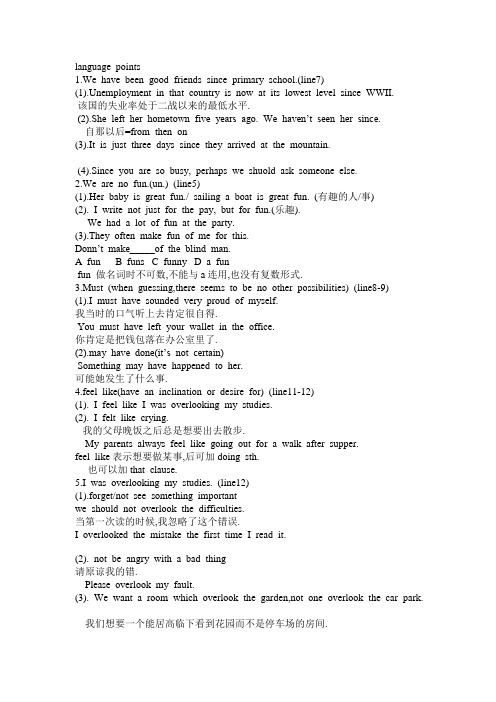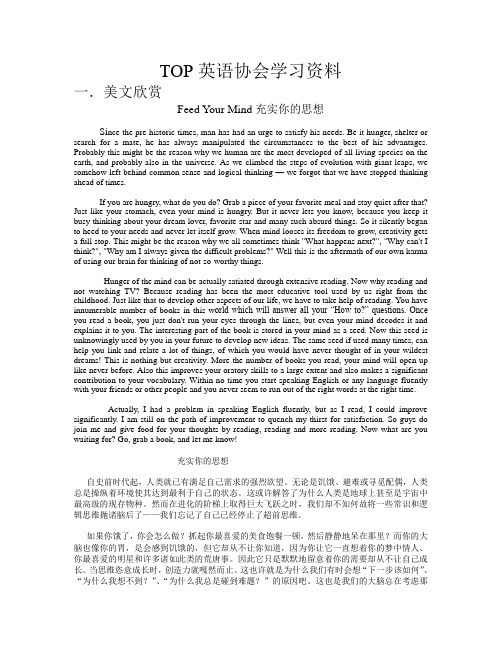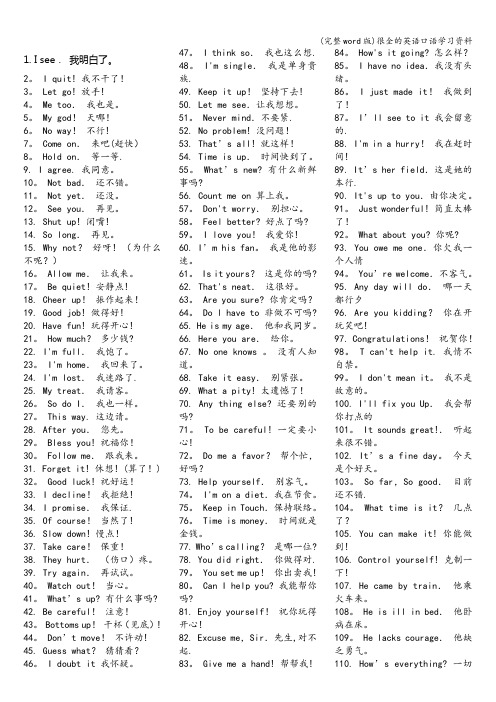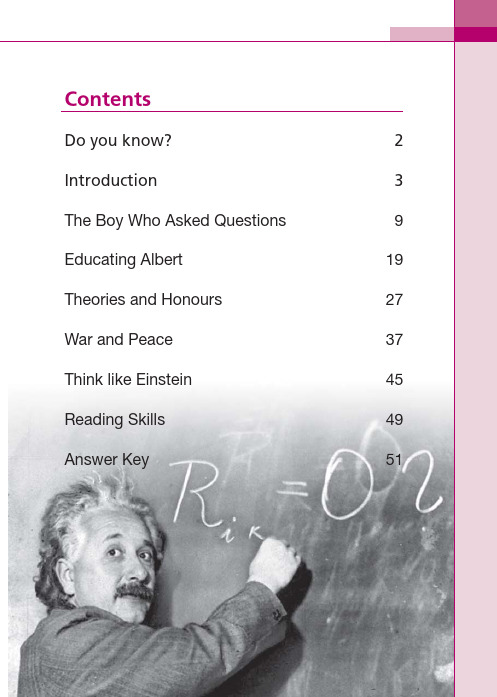英语学习资料
- 格式:doc
- 大小:25.00 KB
- 文档页数:2

language points1.We have been good friends since primary school.(line7)(1).Unemployment in that country is now at its lowest level since WWII.该国的失业率处于二战以来的最低水平.(2).She left her hometown five years ago. We haven’t seen her since.自那以后=from then on(3).It is just three days since they arrived at the mountain.(4).Since you are so busy, perhaps we shuold ask someone else.2.We are no fun.(un.) (line5)(1).Her baby is great fun./ sailing a boat is great fun. (有趣的人/事)(2). I write not just for the pay, but for fun.(乐趣).We had a lot of fun at the party.(3).They often make fun of me for this.Donn’t make_____of the blind man.A funB funsC funnyD a funfun 做名词时不可数,不能与a连用,也没有复数形式.3.Must (when guessing,there seems to be no other possibilities) (line8-9) (1).I must have sounded very proud of myself.我当时的口气听上去肯定很自得.You must have left your wallet in the office.你肯定是把钱包落在办公室里了.(2).may have done(it’s not certain)Something may have happened to her.可能她发生了什么事.4.feel like(have an inclination or desire for) (line11-12)(1). I feel like I was overlooking my studies.(2). I felt like crying.我的父母晚饭之后总是想要出去散步.My parents always feel like going out for a walk after supper.feel like表示想要做某事,后可加doing sth.也可以加that clause.5.I was overlooking my studies. (line12)(1).forget/not see something importantwe should not overlook the difficulties.当第一次读的时候,我忽略了这个错误.I overlooked the mistake the first time I read it.(2). not be angry with a bad thing请原谅我的错.Please overlook my fault.(3). We want a room which overlook the garden,not one overlook the car park.我们想要一个能居高临下看到花园而不是停车场的房间.6.I was determined to be cheerful.(line14)(1)adj.a.He is determined to take part in the international speech competititon.b.he is a determined supporter of President Bush.(2)vi.He determined to take part in the international speech competition.他决定参加国际演讲比赛.(3)vt.a.规定,确定例:They determined the date for the party.7. He kept on saying really mean things to hurt me. (line44-45)(1).不要对她如此刻薄.Don’t be so mean to her.(2). He was very mean with his money.unwilling to share or give what one has(3). It is a mean dog. Be careful it does’t bite you.Bad-tempered/liking to h urt(4). Running ten miles is no mean achievement. very good8.I can’t stand seeing my team lose.(line45-46)(1)stand sb./sth.例:I can’t stand a lot of noise when I am reading.当我阅读时忍受不了那么大的噪声I can’t stand this cold weather.我忍受不了那么冷的天气.He can’t bear that man. He talked too much.9.I can’t help wondering….. (line52-53)(1)cannot help doing sth.情不自禁做某事例: He cannot help talking to his deskmate in class.上课时他忍不住要和同桌讲话.(2)cannot help it 没有办法例: He just can’t help it. He has to obey orders.(3)can’t help do sth.无法帮助做某事例:I can’t help do the housework for my mum.Grammar:动词不定式Ⅰ. 不定式句法功能1. 作主语:The cat said, “To take roller coaster” is terrible.不定式短语作主语时,可以直接放在句首,但在很多情况下,尤其是在疑问句和感叹句中,往往放在谓语之后,而用先行代词it作形式主语。

TOP英语协会学习资料一.美文欣赏Feed Your Mind充实你的思想Si nce the pre-historic times, man has had an urge to satisfy his needs. Be it hunger, shelter or search for a mate, he has always manipulated the circumstances to the best of his advantages. Probably this might be the reason why we human are the most developed of all living species on the earth, and probably also in the universe. As we climbed the steps of evolution with giant leaps, we somehow left behind common sense and logical thinking — we forgot that we have stopped thinking ahead of times.If you are hungry, what do you do? Grab a piece of your favorite meal and stay quiet after that? Just like your stomach, even your mind is hungry. But it never lets you know, because you keep it busy thinking about your dream lover, favorite star and many such absurd things. So it silently began to heed to your needs and never let itself grow. When mind looses its freedom to grow, creativity gets a full stop. This might be the reason why we all sometimes think "What happens next?", "Why can't I think?", "Why am I always given the difficult problems?" Well this is the aftermath of our own karma of using our brain for thinking of not-so-worthy things.Hunger of the mind can be actually satiated through extensive reading. Now why reading and not watching TV? Because reading has been the most educative tool used by us right from the childhood. Just like that to develop other aspects of our life, we have to take help of reading. You have innumerable number of books in this w orld which will answer all your “How to?” questions. Once you read a book, you just don't run your eyes through the lines, but even your mind decodes it and explains it to you. The interesting part of the book is stored in your mind as a seed. Now this seed is unknowingly used by you in your future to develop new ideas. The same seed if used many times, can help you link and relate a lot of things, of which you would have never thought of in your wildest dreams! This is nothing but creativity. More the number of books you read, your mind will open up like never before. Also this improves your oratory skills to a large extent and also makes a significant contribution to your vocabulary. Within no time you start speaking English or any language fluently with your friends or other people and you never seem to run out of the right words at the right time.Actually, I had a problem in speaking English fluently, but as I read, I could improve significantly. I am still on the path of improvement to quench my thirst for satisfaction. So guys do join me and give food for your thoughts by reading, reading and more reading. Now what are you waiting for? Go, grab a book, and let me know!充实你的思想自史前时代起,人类就已有满足自己需求的强烈欲望。

人教版新版小学六年级英语上册全册学习资料简介本文档为人教版新版小学六年级英语上册全册研究资料的概要。
下面将简要介绍每个单元的内容和重点。
Unit 1: Hello!主题: 自我介绍和问候: 自我介绍和问候重点: 研究用英语进行自我介绍和问候的表达方式,掌握基本的问候语。
: 学习用英语进行自我介绍和问候的表达方式,掌握基本的问候语。
Unit 2: My Family and Friends主题: 家庭和朋友: 家庭和朋友重点: 研究家庭成员和朋友的称谓,描述家庭和朋友的外貌特征和爱好。
: 学习家庭成员和朋友的称谓,描述家庭和朋友的外貌特征和爱好。
Unit 3: My School Life主题: 我的校园生活: 我的校园生活重点: 研究描述学校、教室、课程和活动的词汇,了解在校生活中的常见场景。
: 学习描述学校、教室、课程和活动的词汇,了解在校生活中的常见场景。
Unit 4: Leisure Time主题: 休闲时间: 休闲时间重点: 研究谈论休闲活动和爱好,了解并运用动词的ing形式。
: 学习谈论休闲活动和爱好,了解并运用动词的ing形式。
Unit 5: Let's Celebrate!主题: 节日庆祝: 节日庆祝重点: 研究讨论各种节日和庆祝活动,掌握相应的表达方式和词汇。
: 学习讨论各种节日和庆祝活动,掌握相应的表达方式和词汇。
Unit 6: Nature and Environment主题: 自然和环境: 自然和环境重点: 研究描述动物、植物和环境的词汇,了解一些自然保护的知识。
: 学习描述动物、植物和环境的词汇,了解一些自然保护的知识。
总结本册教材包含了六个单元的研究内容,涵盖了日常生活中常见的话题。
通过研究这些内容,学生将能够掌握基本的英语交流能力,并丰富自己的词汇量。
希望本册教材能对学生的英语研究有所帮助。
以上是《人教版新版小学六年级英语上册全册学习资料》的简要介绍。
如需详细内容,请参阅教材。

初中英语语法学习资料初中英语语法一、词类、句子成分和构词法:1、词类:英语词类分十种:名词、形容词、代词、数词、冠词、动词、副词、介词、连词、感叹词。
1、名词(n.): 表示人、事物、地点或抽象概念的名称。
如:boy, morning, bag, ball, class, orange.2、代词(pron.): 主要用来代替名词。
如:who, she, you, it .3、形容词(adj..):表示人或事物的性质或特征。
如:good, right, white, orange .4、数词(num.): 表示数目或事物的顺序。
如:one, two, three, first, second, third, fourth.5、动词(v.): 表示动作或状态。
如:am, is,are,have,see .6、副词(adv.): 修饰动词、形容词或其他副词,说明时间、地点、程度等。
如:now, very, here, often, quietly, slowly.7、冠词(art..):用在名词前,帮助说明名词。
如:a, an, the. 8、介词(prep.): 表示它后面的名词或代词与其他句子成分的关系。
如in, on, from, above, behind.9、连词(conj.): 用来连接词、短语或句子。
如and, but, before . 10、感叹词(interj..)表示喜、怒、哀、乐等感情。
如:oh, well, hi, hello. 2、句子成分:英语句子成分分为七种:主语、谓语、宾语、定语、状语、表语、宾语补足语。
1、主语是句子所要说的人或事物,回答是"谁"或者"什么"。
通常用名词或代词担任。
如:I’m Miss Green.(我是格林小姐)2、谓语动词说明主语的动作或状态,回答"做(什么)"。
主要由动词担任。
如:Jack cleans the room every day. (杰克每天打扫房间)3、表语在系动词之后,说明主语的身份或特征,回答是"什么"或者"怎么样"。

1. I see.我明白了。
2。
I quit! 我不干了!3。
Let go! 放手!4。
Me too.我也是。
5。
My god!天哪!6。
No way!不行!7。
Come on.来吧(赶快)8。
Hold on.等一等.9. I agree. 我同意。
10。
Not bad.还不错。
11。
Not yet.还没。
12。
See you.再见。
13. Shut up! 闭嘴!14. So long.再见。
15. Why not?好呀! (为什么不呢?)16。
Allow me.让我来。
17。
Be quiet! 安静点!18. Cheer up!振作起来!19. Good job! 做得好!20. Have fun! 玩得开心!21。
How much?多少钱?22. I'm full.我饱了。
23。
I'm home.我回来了。
24. I'm lost.我迷路了.25. My treat.我请客。
26。
So do I.我也一样。
27。
This way. 这边请。
28. After you.您先。
29。
Bless you! 祝福你!30。
Follow me.跟我来。
31. Forget it! 休想! (算了!) 32。
Good luck! 祝好运!33. I decline!我拒绝!34. I promise.我保证.35. Of course!当然了!36. Slow down! 慢点!37. Take care!保重!38. They hurt.(伤口)疼。
39. Try again.再试试。
40。
Watch out!当心。
41。
What’s up? 有什么事吗?42. Be careful!注意!43。
Bottoms up!干杯(见底)! 44。
Don’t move!不许动! 45. Guess what?猜猜看?46。
I doubt it 我怀疑。

英语学习资料总结(初级)英语学习资料1. 26个英⽂字母Aa、Bb、Cc、Dd、Ee、Ff、Gg、Hh、Ii、Jj、Kk、Ll、Mm、Nn、Oo、Pp、Qq、Rr、Ss、Tt、Uu、Vv、Ww、Xx、Yy、Zz;2. 星期(week)Monday星期⼀Tuesday星期⼆Wednesday星期三Thursday星期四Friday星期五Saturday星期六Sunday星期天weekend周末3. ⽉份(months)Jan. (January)⼀⽉Feb.(February)⼆⽉Mar.(March)三⽉April四⽉May五⽉June六⽉July七⽉Aug.(August)⼋⽉Sept. (September)九⽉Oct.(October)⼗⽉Nov.(November)⼗⼀⽉Dec.(December)⼗⼆⽉4. 季节(seasons)spring春summer夏fall/autumn秋winter冬5. ⽅位(directions)south南north北east东west西left 左边right右边6. ⼈体(body)foot脚head头face脸hair头发nose⿐⼦mouth嘴eye眼睛ear⽿朵arm⼿臂hand⼿finger⼿指leg腿tail尾巴7. 颜⾊(colours)red红blue蓝yellow黄green绿white⽩black⿊pink粉红purple紫orange 橙brown棕8.⼈物(people)friend朋友boy男孩girl⼥孩mother母亲father⽗亲sister姐妹brother兄弟uncle叔叔;舅舅man男⼈woman⼥⼈Mr.先⽣Miss⼩姐lady⼥⼠;⼩姐mom 妈妈dad爸爸parents⽗母grandparents祖⽗母grandma/grandmother(外)祖母grandpa/grandfather(外)祖⽗aunt姑姑cousin堂(表)兄弟;堂(表)姐妹son⼉⼦daughter⼥⼉baby婴⼉kid⼩孩classmate同学queen⼥王visitor 参观者neighbour邻居principal校长university student⼤学⽣pen pal笔友tourist旅⾏者people ⼈物robot机器⼈9. 职业(jobs)teacher教师student学⽣doctor医⽣nurse护⼠driver司机farmer农民singer 歌唱家writer作家actor男演员actress⼥演员artist画家TV reporter电视台记者engineer⼯程师accountant会计policeman(男)警察salesperson销售员cleaner清洁⼯baseball player棒球运动员assistant售货员police警察10. 学习⽤品(school things)pen钢笔pencil铅笔pencil-case铅笔盒ruler尺⼦book书bag包comic book 漫画书post card明信⽚newspaper报纸schoolbag书包eraser橡⽪crayon蜡笔sharpener卷笔⼑story-book故事书notebook笔记本Chinese book语⽂书English book英语书math book数学书magazine杂志dictionary词典11. 课程(classes)sports体育运动science科学Moral Education思想品德课Social Studies社会课Chinese语⽂math数学PE体育课English英语课12. 国家、城市(countries & cities)China/PRC中国America/USA美国UK联合王国England英国Canada/CAN加拿⼤Australia澳⼤利亚New York纽约London伦敦Sydney悉尼Moscow莫斯科Cairo开罗13. ⾷品、饮料(food & drink)rice⽶饭bread⾯包beef⽜⾁milk⽜奶water⽔egg蛋fish鱼tofu⾖腐cake 蛋糕hot dog热狗hamburger汉堡包French fries炸薯条cookie曲奇biscuit饼⼲jam果酱noodles⾯条meat⾁chicken鸡⾁pork猪⾁mutton⽺⾁vegetable 蔬菜salad沙拉soup汤ice冰ice-cream冰淇淋Coke可乐juice果汁tea茶coffee咖啡breakfast早餐lunch午餐dinner/supper晚餐meal⼀餐14. ⽔果、蔬菜(fruit & vegetables)apple苹果banana⾹蕉pear梨orange橙watermelon西⽠grape葡萄eggplant 茄⼦green beans青⾖tomato西红柿potato⼟⾖peach桃strawberry草莓cucumber黄⽠onion洋葱carrot胡萝⼘cabbage卷⼼菜15. ⾐服(clothes)jacket夹克衫shirt衬衫T-shirt丅恤衫skirt短裙⼦dress连⾐裙jeans⽜仔裤pants长裤socks袜⼦shoes鞋⼦sweater⽑⾐coat上⾐raincoat⾬⾐shorts短裤sneakers⽹球鞋slippers拖鞋sandals凉鞋boots靴⼦hat(有沿的)帽⼦cap 便帽sunglasses太阳镜tie领带scarf围⼱gloves⼿套trousers裤⼦cloth布16. 交通⼯具(vehicles)bike⾃⾏车bus公共汽车train⽕车boat⼩船ship轮船yacht快艇car⼩汽车taxi出租车jeep吉普车van⼩货车;⾯包车plane/airplane飞机subway/underground地铁motor cycle摩托车17. 杂物(other things)window窗户door门desk课桌chair椅⼦bed床computer计算机board写字板fan风扇light灯teacher's desk讲台picture图画;照⽚wall墙壁floor地板curtain窗帘trash bin垃圾箱closet壁橱mirror镜⼦end table床头柜football/soccer⾜球present礼物walkman随⾝听lamp台灯phone电话sofa沙发shelf书架fridge冰箱table桌⼦TV电视air-conditioner空调key钥匙lock 锁photo照⽚chart图表plate盘⼦knife⼑fork叉spoon勺⼦chopsticks筷⼦pot锅gift礼物toy玩具doll 洋娃娃ball球balloon⽓球kite风筝jigsaw puzzle 拼图游戏box盒⼦umbrella伞zipper拉链violin⼩提琴yo-yo溜溜球nest鸟窝hole 洞tube管⼦toothbrush⽛刷menu菜单e-card电⼦卡⽚e-mail电⼦邮件traffic light交通灯money钱medicine药18. 地点(locations)home家room房间bedroom卧室bathroom卫⽣间living room起居室kitchen 厨房classroom教室school学校park公园library图书馆post office邮局police office警察局hospital医院cinema电影院bookstore书店farm农场zoo动物园garden花园study书房playground操场canteen⾷堂teacher's office教师办公室library图书馆gym体育馆washroom卫⽣间art room绘画教室computer room 计算机教室music room⾳乐教室TV room电视机房flat公寓company公司factory⼯⼚fruit stand⽔果摊pet shop宠物商店nature park⾃然公园theme park主题公园science museum科学博物馆the Great Wall长城supermarket超市bank银⾏country国家village乡村city城市hometown家乡bus stop公交车站19. ⽓象(weather)cold寒冷的warm温暖的cool凉爽的snowy下雪的sunny晴朗的hot炎热的rainy下⾬的windy有风的cloudy多云的weather report 天⽓预报20. 景物(nature)river河流lake湖泊stream河;溪forest森林path⼩道road公路house房⼦bridge桥building建筑物rain⾬cloud云sun太阳mountain⼭sky天空rainbow彩虹wind风air空⽓moon⽉亮21. 动物(animals)cat猫dog狗pig猪duck鸭rabbit兔horse马elephant⼤象ant蚂蚁fish鱼bird鸟eagle鹰beaver海狸snake蛇mouse⽼⿏squirrel松⿏kangaroo袋⿏monkey猴panda熊猫bear熊lion狮⼦tiger⽼虎fox狐狸zebra斑马deer⿅giraffe长颈⿅goose鹅hen母鸡turkey⽕鸡lamb⼩⽺sheep绵⽺goat⼭⽺cow奶⽜donkey驴squid鱿鱼lobster龙虾shark鲨鱼seal海豹sperm whale 抹⾹鲸killer whale虎鲸22. 植物(plants)flower花grass草tree树seed种⼦sprout苗plant植物rose玫瑰leaf叶⼦23. 患病(illness)have a fever发烧hurt疼痛have a cold感冒have a toothache⽛疼have a headache头疼have a sore throat喉咙疼24. 数词(numbers)one⼀two⼆three三four四five五six六seven七eight⼋nine九ten⼗eleven⼗⼀twelve⼗⼆thirteen⼗三fourteen⼗四fifteen⼗五sixteen⼗六seventeen⼗七eighteen⼗⼋nineteen⼗九twenty⼆⼗thirty三⼗forty四⼗fifty五⼗sixty六⼗seventy七⼗eighty⼋⼗ninety九⼗hundred百one/a hundred and thirty-nine⼀百三⼗九first第⼀second第⼆third第三fourth第四fifth第五eighth第⼋ninth第九twelfth第⼗⼆twentieth第⼆⼗thirtieth第三⼗fortieth第四⼗fiftieth第五⼗sixtieth第六⼗seventieth第七⼗eightieth第⼋⼗ninetieth第九⼗fifty-sixth第五⼗六25. 形容词(adj.)big⼤的small⼩的long长的tall⾼的short短的;矮的young年轻的old旧的;⽼的strong健壮的thin瘦的active积极活跃的quiet安静的nice好看的kind 和蔼亲切的strict严格的smart聪明的funny滑稽可笑的tasty好吃的sweet甜的salty咸的sour酸的fresh新鲜的favourite最喜爱的clean⼲净的tired疲劳的excited兴奋的angry⽣⽓的happy⾼兴的bored⽆聊的sad忧愁的taller更⾼的shorter 更矮的stronger更强壮的older年龄更⼤的younger更年轻的bigger更⼤的heavier更重的longer更长的thinner更瘦的smaller更⼩的good 好的fine好的great很好的heavy 重的new新的fat胖的happy快乐的right 对的hungry饥饿的cute逗⼈喜爱的little⼩的lovely可爱的beautiful漂亮的colourful⾊彩鲜艳的pretty漂亮的cheap便宜的expensive昂贵的juicy多汁的tender嫩的healthy健康的ill有病的helpful有帮助的high⾼的easy简单的proud骄傲的sick有病的better更好的higher更⾼的26. 介词(prep.)in在……⾥on在……上;在……时候under在……下⾯near在……的旁边behind在……后边next to与……相邻over在……上⾯in front of在……前⾯27. 代词(pron.)I我we我们you你;你们he他she她it它they他(她,它)们my我的our 我们的your你的;你们的his他的her她的28. 动词(v.)play(.ed)玩;踢swim(swam)游泳skate滑冰fly(flew)飞jump跳walk⾛run(run)跑climb爬fight(fought)打架swing(swung)荡eat(ate)吃sleep(slept)睡觉like 像,喜欢have(had)有;吃turn转弯buy(bought)买take(took)买;带live居住teach(taught)教go(went)去study(studied)学习learn学习sing(sang)唱歌dance 跳舞row划do(did)做do homework做作业do housework做家务watch TV看电视read(read) books读书cook the meals做饭water the flowers浇花sweep(swept) the floor扫地clean the bedroom打扫卧室make(made) the bed铺床set(set) the table摆饭桌wash the clothes洗⾐服do the dishes洗碗碟use a computer使⽤计算机do morning exercises晨练;做⼴播操eat breakfast吃早饭eat dinner吃晚饭go to school上学have English class上英语课play sports进⾏体育运动get(got)up起床climb mountains爬⼭go shopping买东西play the piano 弹钢琴visit grandparents看望(外)祖⽗母go hiking去远⾜fly kites放风筝make a snowman堆雪⼈plant trees种树draw(drew) pictures画画cook dinner做饭read a book看书answer the phone接电话listen to music听⾳乐clean the room打扫房间write(wrote) a letter写信write an e-mail写电⼦邮件drink(drank) water喝⽔take pictures照相watch insects观察昆⾍pick up leaves采摘树叶do an experiment做实验catch butterflies捉蝴蝶count insects数昆⾍collect insects 收集昆⾍collect leaves收集树叶write a report写报告play chess下棋have a picnic举⾏野餐get to到达ride(rode) a bike骑⾃⾏车play the violin拉⼩提琴make kites制作风筝collect stamps集邮meet(met)见⾯welcome欢迎thank谢谢love爱work⼯作drink(drank)喝taste尝smell闻feed(fed)喂养shear剪milk 挤奶look看guess猜help帮助pass传递show展⽰use 使⽤clean打扫open 打开close关上put放paint绘画tell(told)告诉kick踢bounce反弹ride(rode)骑stop(stopped)停wait等find(found)寻找到drive(drove)驾驶fold折send(sent)寄wash洗shine照耀become变成feel(felt)感觉到think(thought)思考meet(met)遇见fall(fell)落下leave(left)离开wake(woke) up醒来put on穿上take off脱掉hang up挂起wear(wore)穿go home回家go to bed上床睡觉play computer games玩电脑游戏play chess下棋empty the trash倒垃圾put away the clothes收拾⾐服get off 下车take a trip去旅⾏read a magazine阅读杂志go to the cinema 去看电影go straight向前直⾛。
学位英语重点复习资料一、词汇与语法1、词汇:积累词汇量是英语学习的关键。
复习时,应注重对常用词汇的理解和应用。
记忆单词的方法可以是结合语境进行记忆,这样更有利于理解和记忆。
2、语法:语法是英语学习的另一重要部分。
复习时,应注重对各种语法规则的理解和应用,尤其是时态、语态、从句等高级语法。
二、阅读理解阅读理解是学位英语考试的重要部分,复习时应注意提高阅读速度和理解能力。
可以通过阅读英文文章、新闻报道、学术论文等来提高阅读理解能力。
同时,学会根据上下文理解文章的意思,注意总结文章主旨和结构。
三、写作与翻译1、写作:写作部分要求考生能够写出结构清晰、语法正确的英语文章。
复习时,可以练习写作各种类型的文章,如议论文、说明文、记叙文等。
注意提高写作的逻辑性和条理性。
2、翻译:翻译部分要求考生能够准确地将英文翻译成中文。
复习时,可以多做一些翻译练习,注意对英文句子结构和含义的理解。
四、听力与口语1、听力:听力部分要求考生能够听懂英语口语中的常用表达和基本对话。
复习时,可以听一些英语新闻、电影、讲座等来提高听力理解能力。
2、口语:口语部分要求考生能够用英语进行基本的交流和表达。
复习时,可以与英语母语者进行对话练习,或者通过英语角等活动来提高口语表达能力。
以上是学位英语重点复习资料,希望能够帮助大家更好地准备考试。
祝大家成功!复习资料电大本科学位英语复习资料标题:复习资料:电大本科学位英语复习资料一、考试概述电大本科学位英语考试旨在测试学生的英语综合能力,包括词汇、语法、阅读理解、写作和听力。
考试形式为闭卷笔试,总分为100分,及格分数为60分。
了解考试大纲和题型,有针对性地进行复习,是提高考试成绩的关键。
二、词汇复习词汇是英语学习的基础,也是学位英语考试的重要部分。
复习时,建议采取以下策略:1、制定复习计划,每天背诵一定数量的单词,包括课内和课外的重点词汇。
2、运用记忆规律,如艾宾浩斯曲线,进行复习和巩固,提高记忆效果。
晨背话题(一) 语言学习一、背话题词块——有话可说1.the attitude to learning 学习态度2.the effective way to do sth. 做某事的有效方法3.enlarge one’s vocabulary 扩大词汇量4.broaden one’s horizons 开阔视野5.oral/spoken English 英语口语6.English corner 英语角7.equip...with ... 使……具备……8.develop one’s interest 培养兴趣9.form the habit of reading 养成阅读习惯10.make full use of 充分利用11.give up 放弃12.Practice makes perfect. 熟能生巧。
13.refer to/consult a dictionary 查词典14.express oneself in English fluently用英语流利地表达自己的思想15.give sb. some advice on ... 关于……给某人提出建议16.make great progress in 在……取得很大进步17.build up one’s confidence 增强自信心18.have a good command of ... 精通……19.makes ense of 弄懂,理解20.concentrate on 集中注意力于21.learn by heart 用心记22.benefit from ... 从……获益23.pick up 偶然学会24.step by step 逐步地二、背话题佳句——有话会说1.As the world is becoming a global village, English is getting more and more important. So mastering English means we can see the world through a new window.随着世界正在变成一个地球村,英语变得越来越重要。
英语入门学习资料英语是世界上最广泛使用的语言之一,学习英语对于提高国际交流和职业竞争力非常重要。
对于英语初学者来说,掌握一些基础的学习资料可以帮助他们建立起牢固的语言基础。
以下是一些适合英语入门学习的资料,供大家参考。
1. 词汇学习资料:- 《牛津英语词典》:这是一本全面详尽的英语词典,包含了大量的英语词汇及其释义,适合初学者用来查找和学习新单词。
- 《英语常用词汇学习手册》:这本书收录了常用的英语单词,以及它们的用法和例句,能帮助初学者建立起一定的词汇量。
2. 语法学习资料:- 《英语语法教程》:这本书可以帮助初学者理解英语语法的基本概念和规则,并提供了大量的例句和练习题,可以帮助初学者巩固所学的语法知识。
- 《剑桥英语语法》:这是一本较为全面的英语语法参考书,可以帮助初学者理解和掌握英语语法的各个方面。
3. 听力学习资料:- 《英语流行歌曲》:通过听英文歌曲能够提高听力能力,同时也有助于学习地道的英语表达方式和常用词汇。
- 《VOA慢速英语新闻》:VOA慢速英语新闻提供了以简洁明了的方式呈现的新闻报道,适合初学者用来提高听力和理解能力。
4. 阅读学习资料:- 《英语阅读教程》:这本书收录了一些简短的英语文章,适合初学者用来提高阅读能力和理解能力。
- 《英语经典小说》:选择一些适合自己水平的经典英语小说进行阅读,可以提高阅读技巧和丰富词汇量。
5. 口语学习资料:- 《英语口语学习指南》:这本书提供了一些常用的口语表达方式和例句,适合初学者用来提高口语能力。
- 与英语为母语的人交流:与英语为母语的人进行交流是提高口语能力的最好方式,可以通过一些英语角、语言交流网站等途径找到合适的交流伙伴。
这些学习资料可以帮助初学者全面提高英语水平,但最重要的还是坚持学习和练习。
通过不断地积累词汇、理解语法、提高听说读写的能力,初学者将能够逐渐感受到英语的魅力和实用性。
Daily News December 15 , 2009
1.The UN's Copenhagen Climate Conference started on December 7 and aims to reach
a new agreement to deal with global climate change. However, due to severe differences among different countries, if they want to come to an agreement that is legally binding, four obstacles must be overcome.
2.The first is the developed countries' emission reduction goals for 2020, which are also known as the middle-term goals. Developing countries require developed countries to fulfill their commitments of reducing emissions by at least 40 percent in 2020 .compared to 1990, which they made during the "Bali Roadmap" in 2007. However, so far, only Norway has said that it will reduce its emission by 40 percent by 2020 compared to 1990. The European Union promised 20 percent; Japan promised 25 percent; but the US only promised 4 percent. Fierce quarrels and severe differences will inevitably appear between developed and developing countries should the developed countries refuse to fulfill the commitments they made during the "Bali Roadmap".
3.The second obstacle is the emissions reduction issues of big developing countries, such as China and India. The third obstacle is technical and funding sources that developing countries need to ____ _____climate change. As developed countries have inescapable historical obligations for the climate change issue, developing countries have called on them to take the lead in emissions reduction and provide developing countries with funding and technical support for combating climate change. However, developed countries that have strongly urged developing countries to promise specific emissions reduction targets are unwilling to provide developing countries substantial funding and technical assistance. The fourth is the frameworks and principles for climate change negotiation.
4.In short, the Copenhagen Climate Change Conference cannot reach any legally binding, global emissions reduction agreement unless it can ______ the above "four obstacles." Otherwise, only a political declaration or promise without legally binding force can be concluded.
1. Give the passage the best title_____________________________________________.
2. What is the purpose of the UN’s Copenhagen Climate Conference?
_________________________________________________________________________________ 3. All the developed countries has fulfilled their commitments of reducing emissions by at least 40%in 2020. T/F
4. Fill in the blanks in the paragraph3 ____ ____and the last paragraph ______
5. Translate the underlined sentence in paragraph 3
_______________________________________________________________________
3. .工业化国家的温室气体减排额是多少?
2.像中国、印度这样的主要发展中国家应如何控制温室气体的排放?
3.如何资助发展中国家减少温室气体排放、适应气候变化带来的影响?
4.如何管理这笔资金?
Four obstacles to overcome at Copenhagen Climate Conference。